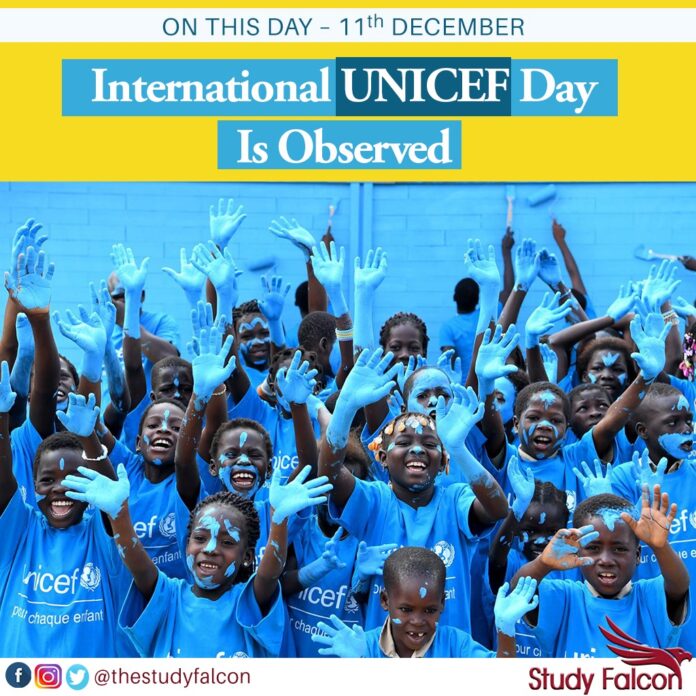UNICEF day is celebrated on December 11 every year as the organisation guarding children’s rights was founded on the same date in the year 1946. The United Nations Children’s Fund (UNICEF) is a United Nations agency responsible for providing humanitarian and developmental aid to children around the world. It was established by the UN General Assembly, at the behest of Polish physician Ludwik Rajchman.
UNICEF is one of the most extensive and distinguished social-welfare organizations in the world, with a presence in 192 countries and territories. It was founded in 1946 to help protect children after the second world war. Its main aim was to help the starving and ill children from war-torn regions in Europe, China and the Middle East.
The organisation was originally named United Nations International Children’s Emergency Fund. In 1953, two words ‘International and ‘Emergency’ were dropped but the acronym continued.
UNICEF is the beneficiary of the International Children’s Emergency Fund (ICEF), which was created by the U.N. Relief Rehabilitation Administration in 1946 to provide children and mothers affected by World War II with immediate aid. In that same year, the U.N. General Assembly founded the United Nations International Children’s Emergency Fund (UNICEF) to further institutionalize post-war relief work.
UNICEF works in 190 countries and territories aiming to save children’s lives, to defend their rights, and to help them fulfil their potential, from early childhood through adolescence. UNICRC or United Nations Convention on the Rights of the Child is the basis of UNICEF’S work. The Convention has 54 articles that cover all aspects of a child’s life and set out the civil, political, economic, social and cultural rights that all children are entitled to. It also explains how adults and governments must work together to make sure all children can enjoy all their rights.
UNICEF works in the field of adolescent development, uprooted children, communications, gender equality, child protection, children with disability, environment and climate change and social inclusion of underprivileged children. The flag of UNICEF is blue in colour and includes the globe and olive leaves from the UN flag. It features a mother and child in the globe circle. UNICEF’s main goal is to give ‘every child the chance to grow up healthy, happy and safe’.
The organisation began its work in India in 1949 with three staff members and established an office in Delhi three years later. Currently, it advocates for the rights of India’s children in 16 states.
According to its 2018 report, UNICEF supported birth in health facilities for 27 million babies, three doses of the Pentavalent vaccine for an estimated 65.5 million children, education for 12 million children and treatment for 4 million children with severe acute malnutrition.
UNICEF’s Supply Division is based in Copenhagen, Denmark. It serves as the primary point of distribution for essential items like vaccines, antiretroviral medicines for children and mothers with HIV, nutritional supplements, emergency shelters, family reunification and educational supplies.
UNICEF, or the United Nations Children’s Fund, was initially created to provide emergency food and healthcare to children and mothers in countries that had been devastated by World War II. Now, the reputable and trustworthy charity has helped save more children’s lives than any other humanitarian organization by providing healthcare and immunizations, clean water and sanitation, nutrition, education, emergency relief, and more. On this day, we especially remember their global impact and how we can make a difference ourselves.
UNICEF relies entirely on contributions from governments and private donors. In 2019, UNICEF’s 137 government partners, along with intergovernmental organizations and inter-organizational arrangements, contributed $4.7 billion. The charity organization consists of government representatives that have been appointed by the United Nations Economic and Social Council, generally for three-year terms. 36 members on the executive board establish policies, approve programs, and oversee administrative and financial plans.
UNICEF has and continues to contribute greatly to humanitarian causes around the world. In 2018, it assisted in the birth of 27 million babies, administered pentavalent vaccines to an estimated 65.5 million children, provided education for 12 million children, treated four million children with severe acute malnutrition, and responded to 285 humanitarian emergencies in 90 countries.
For its contribution to humanity, UNICEF has received outstanding recognition for its work, including the Nobel Peace Prize in 1965, the Indira Gandhi Prize in 1989, and the Princess of Asturias Award in 2006. During the 2020 COVID-19 pandemic, UNICEF, along with the World Health Organization and other agencies, issued instructions on healthy parenting. Every year, on December 11, we remember the creation of UNICEF and consider donating to help even more children in need around the world.
The common slogan used by UNICEF is ‘UNICEF for every child’, which again emphasizes on its goal to help children all around the world. It is the 74th anniversary of International UNICEF Day this year.










